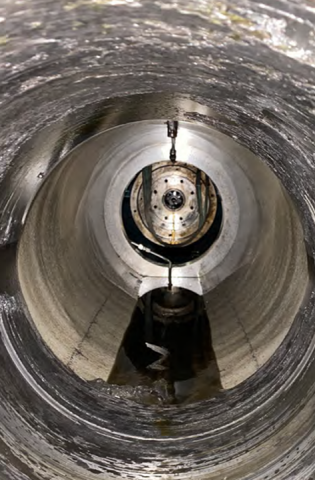More and more damages to the stern tube aft bearings were reported in the last years. Unfortunately, also Briese Shipping made first experiences on two vessels but many other cases from other competitors are known.
Even if all damages have slightly different reasons generally the following root causes have been identified:
BIO Oils (Environmentally Acceptable Lubricants = EALs) for the USA VGP requirement
Vessels sailing to the USA must use an EAL Oil in case a tech-nical infeasible letter is not applicable. There are many dif-ferent BIO oils on the market, and it must be presumed that these oils were not tested with all different available aft seals.
It is confirmed that the BIO EAL Oils have some disadvantag-es. Some EAL Oils are tending to develop acid by hydrolysis.
The time stability of these oils is not as long and important properties like viscosity, lubricity, corrosion protection and oxidative stability are worse compared to mineral oils. All these effects are reducing the lifetime of the sealing rings for the aft seal. Due to the damaged sealing rings, water can enter the stern tube system. If the water ingress re-mains unnoticed, a bearing damage is quite possible. Espe-cially the oil in the last chamber with small volume is aging fast due to a very small exchange rate. To cope with these effects Briese Shipping prepared the Technical Circular T82.
Bad installation and alignment during newbuilding
During the boom time many new shipyards were founded.
On some shipyards the quality standards were below maker requirements. Especially the components of the stern tube and the installation including the alignment have caused aft bearing damages.
Temperature monitoring
All vessels are equipped with a double temperature sensor in way of the aft stern tube bearing. The sensor is connect-ed to the alarm system. It has been noticed in some cases, where the temperature monitoring was not working, wrong alarm setpoints installed, or inaccurate readings/records were carried out. To implement a proper trend analysis a weekly report must be implemented to detect a beginning wear down.
No regular oil sampling and check-up was carried out
In some cases, the class required oil sample (2-3 times per year) was not taken in time. In addition, the oil must be checked visually more often. Especially if a problem is already known or expected due to the age of the seal, the oil condition should be checked even more often. All free water and emulsion is to be drained and refilled.
No familiarization with aft seal system / oil samples taken on wrong place
Also, some cases were noted, where the crew was not fully familiar with the details of the oil system. It has been observed that some oil samples were taken at a wrong place. Most vessels in the Briese fleet have four lip seals with a header, monitoring, and forward seal tank. There-fore, many different locations exist, where an oil sample can be taken. It is of the utmost importance that the sample is taken from the stern tube bottom side. Only there any wear down particles and water can be detected.

Cases have been seen where the sample was taken out of the monitoring tank with a closed valve. No water ingress and no wear down can be detected at that place.
The stern tube bearing is one of the most important com-ponents of the propulsion system. In case of failure the vessel might not be able to sail under own propulsion, which creates a risk to the crew, the cargo and the vessel.
To avoid damages following items should be followed:
- Correct sampling of the stern tube oil in time at the correct place to be carried out (2-3 times per year to laboratory) • In case of abnormalities additional visual inspection of the oil is required
- Free water and emulsion to be drained during port stay (interval depends on condition)
- Proper familiarizing to the complete system
- Temperature monitoring to be done (daily routine, weekly in the weekly report)
- Temperature sensor to be checked at port stay (must be same as sea water temperature)